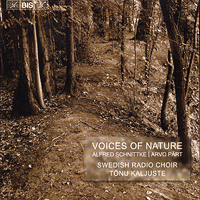This uniquely named work has moments of wondrous luminosity, particularly in its second and fourth movements. The second, which has a hypnotic slow lilt to it, even evokes the sensuality of the Poulenc Gloria (closing section), a most unlikely kinship. There are many inspiring moments and many memorable textures, and any worries the composer may have had about Western performers' response to this music would have been quickly dispelled by Tonu Kaljuste and the outstanding Swedish Radio Choir. Their technical assurance is so great that one can easily admire their powerful identification with the music, while Kaljuste clearly has a superb ear for texture, balancing convincingly Schnittke's often densely complex choral writing. The wordless Voices of Nature is a short relatively simple work for ten women's voices and vibraphone. Its coolness, however, makes a welcome foil to the intensity of the Concerto. Then follow three works by Estonian Arvo Part, and many listeners may experience some surprise at the cheerful, almost humorous nature of Dopo la Vittoria. The title means After the Victory, the text telling the story of how Ambrose, Bishop of Milan in the 4th century, composed the hymn Te Deum and sang it with St. Augustine when baptising him. It is a blithe work, with a wonderfully solemn 'Amen' just near the end, before the good-humoured music returns to round the work off. |


